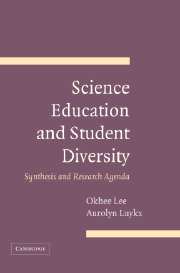Book contents
- Frontmatter
- Contents
- Foreword by Roland G. Tharp
- Acknowledgments
- Introduction
- SECTION I CONCEPTUAL GROUNDING AND POLICY CONTEXT
- SECTION II STUDENT LEARNING AND CLASSROOM PRACTICES
- 3 Students and Science Learning
- 4 Science Curriculum
- 5 Science Instruction
- 6 Science Assessment
- SECTION III CREATING EQUITABLE LEARNING ENVIRONMENTS
- SECTION IV CONCLUSIONS AND A RESEARCH AGENDA
- Appendix: Method for Research Synthesis
- References
- Index
3 - Students and Science Learning
Published online by Cambridge University Press: 04 December 2009
- Frontmatter
- Contents
- Foreword by Roland G. Tharp
- Acknowledgments
- Introduction
- SECTION I CONCEPTUAL GROUNDING AND POLICY CONTEXT
- SECTION II STUDENT LEARNING AND CLASSROOM PRACTICES
- 3 Students and Science Learning
- 4 Science Curriculum
- 5 Science Instruction
- 6 Science Assessment
- SECTION III CREATING EQUITABLE LEARNING ENVIRONMENTS
- SECTION IV CONCLUSIONS AND A RESEARCH AGENDA
- Appendix: Method for Research Synthesis
- References
- Index
Summary
There is a rather extensive body of literature in the broad category of students and science learning, compared to more limited bodies of literature in other categories described later. The studies address a wide range of topics, frame issues from multiple theoretical perspectives, and use various research methods. Some studies examine student characteristics or beliefs related to science learning, others focus on learning processes within the context of science instruction, and yet others provide data on students' learning outcomes. Studies on science learning were often conducted in the context of instructional interventions; those studies that specifically focus on student learning are discussed here, whereas those focusing on teaching are discussed under “Science Instruction” in Chapter 5. Studies on students and science learning have addressed the following topics: (a) student characteristics and school experiences as they relate to science achievement and career choices, (b) students' cultural beliefs and practices in relation to science learning, (c) scientific reasoning and argumentation, (d) the sociopolitical process of learning, and (e) science learning among ELL students.
Factors Related to Science Achievement and Career Choice
In a comprehensive literature review, J. Oakes (1990) described a range of cognitive and affective attributes, school experiences, and societal influences that are linked to differences in science achievement, persistence, and career choice among racial/ethnic and gender groups. The studies reviewed in this section examined various combinations of student characteristics and school experiences.
- Type
- Chapter
- Information
- Science Education and Student DiversitySynthesis and Research Agenda, pp. 33 - 57Publisher: Cambridge University PressPrint publication year: 2006



